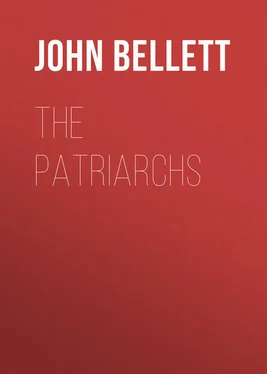John Bellett - The Patriarchs
Здесь есть возможность читать онлайн «John Bellett - The Patriarchs» — ознакомительный отрывок электронной книги совершенно бесплатно, а после прочтения отрывка купить полную версию. В некоторых случаях можно слушать аудио, скачать через торрент в формате fb2 и присутствует краткое содержание. Жанр: foreign_antique, foreign_prose, Биографии и Мемуары, на английском языке. Описание произведения, (предисловие) а так же отзывы посетителей доступны на портале библиотеки ЛибКат.
- Название:The Patriarchs
- Автор:
- Жанр:
- Год:неизвестен
- ISBN:нет данных
- Рейтинг книги:4 / 5. Голосов: 1
-
Избранное:Добавить в избранное
- Отзывы:
-
Ваша оценка:
- 80
- 1
- 2
- 3
- 4
- 5
The Patriarchs: краткое содержание, описание и аннотация
Предлагаем к чтению аннотацию, описание, краткое содержание или предисловие (зависит от того, что написал сам автор книги «The Patriarchs»). Если вы не нашли необходимую информацию о книге — напишите в комментариях, мы постараемся отыскать её.
The Patriarchs — читать онлайн ознакомительный отрывок
Ниже представлен текст книги, разбитый по страницам. Система сохранения места последней прочитанной страницы, позволяет с удобством читать онлайн бесплатно книгу «The Patriarchs», без необходимости каждый раз заново искать на чём Вы остановились. Поставьте закладку, и сможете в любой момент перейти на страницу, на которой закончили чтение.
Интервал:
Закладка:
Horses and chariots filled the mountain; but the prophet's servant had to get his eye opened ere he could see them. Daniel saw a glorious stranger, and heard his voice as the voice of a multitude; but the men who stood with him saw nothing-only a terror fell on them. The glory on "the holy hill" shone only in the sight of Peter, James, and John, though the brightness there at that moment (night as it was) might have lighted up all the land; for the divine face "did shine as the sun." Many bodies of saints arose, attendants on the Lord's rising; but it was only to some in the holy city they showed themselves. The heaven was opened over the head of the martyr of Jesus, in the very midst of a multitude; but the glory was seen only by him. Paul went to Paradise, and Philip to Azotus; but no eye of man tracked either the flight or the journey. And beyond all, when Jesus rose, and that, too, from a tomb of hewn stone, and from amid a guard of wakeful soldiers, no ear or eye was in the secret. It was a lie, that the keepers of the stone slept; but it is a truth, that they saw no more of the resurrection than had they done so. Silence and secrecy thus mark all these glorious transactions. Visions, audiences, resurrections, flights, ascensions, the glory down here, and the heaven opened up there, all these go on, and yet mere man is a stranger to all. And the translation of Enoch takes company with all these, I assuredly judge; and so, I further judge, will another glorious hour soon to come, in which "they that are Christ's" are all to be interested.
I have now reached and closed the fifth chapter. The first part of the Book of Genesis will be found to end here. For these chapters (i. – v.) constitute a little volume.
I. This chapter opens the volume with the work of creation.
II. Creation being complete, the Lord, the Creator, takes His delight in it; and in the midst of it, and over it, places the man whom He had formed in His own image, with all endowments and possessions to make his condition perfect.
III. Man, thus made perfect, being tried and overcome, we see the ruin which he wrought, and the redemption which God provided.
IV. V. These chapters then show us one branch of this ruined, redeemed family choosing the ruins, and another branch of it delighting in the redemption.
This is simple, and yet perfect. The tale is told-a tale of other days; but in the results and sympathies of which we live at this hour.
It is the sight of the elect, believing, heavenly household, which we get in this little volume, which has at this time drawn my thoughts to it. They walked on earth as we should walk; but they were, by their faith, hope, and destiny, all the while, very near heaven, as we are.
Are we touching the skirts of such glory with unaffected hearts, beloved? Does anything more humble you in His presence, I ask you (for my own soul has already given its answer), than the conviction we have of the little estimation in which the heart holds His promised glory? It is terrible discovery to make of oneself. That we have but small delight in the provisions of His goodness, is more terrible than that we have no answer to the demands of His righteousness. And yet both stand in proof against us. After Israel had left Egypt, they were tested by the voice of the law; but the golden calf tells that they had no answer for it. In the progress of their journey, they are tested by the firstfruits of Canaan; but the desired captain tells that they had no relish for the feast. And what is the heart of man still? What was it in Christ's day? The parable of the marriage of the king's son, like the captain of the wilderness, tells us that there is no relish there for the table which God spreads. What are singing men and singing women to a heavy ear? The pleasant land is despised still. Canaan is not worth the scaling of a single wall, or an encounter with one Amalekite. The farm, the merchandise, and the wife, are made the captain to take us back, in spite of the invitations of love and the treasures of glory.
Terrible discovery! And yet it is not hard to make it. The proof of it clings pretty close to us. We know how quickly present interests move us; how loss depresses and profit elates us; and then, again, we know how dull the glory glitters, if but a difficulty or a hazard lie this side of it.
Are we sorry because of this, beloved? Does it ever break the heart into sighs and groans before our God? Sad and solemn, if we feel it not thus-and terrible, when we deliberately talk to ourselves of making a captain again. And this we do when the pastime and the pleasures of the sons of men again give animation to our hearts, or when their honours or their pursuits become again our objects. Lot's wife, beloved, had got beyond Sodom, and that, too, in company with the elect, when it was found that she was still there, in such a sense as to perish with the city. Israel was as far as the wilderness of Paran, and that, too, in company with the ark of God, when it was proved that they were still amid the flesh-pots of Egypt. Serious remembrances for us all! holy warnings, that we wanton not with those lusts and enjoyments, which once we watched and mortified.
"Of that day and hour knoweth no man" – are the solemn words by which the Lord refuses to pledge the moment of His return to His Jewish remnant. Matt. xxiv. 36. That moment is to be to them as the thief of the night, or as the hour of the woman in travail. So as to death. If it come on any of us without a moment's warning, the Lord has not been untrue to any pledge He has given. And so as to the rapture. In no case is the day or the hour pledged or made known. All is included in one word of deep and holy import-"Watch" – and that one word is addressed to all: "What I say unto you, I say unto all, Watch."
Whether the close to us be by death or rapture-whether it be to Israel by being taken or left-the day and the hour remain alike untold; no pledge of it is promised at all. Each and all are set on the watch-tower. We wait for "the Son from heaven;" they will have to wait for "the days of the Son of man;" but neither of us know the hour that closes the waiting.
That is common to them and to us. We stand in equal condition with them as to this. But together with this there is a difference.
The Jewish Remnant are given signs. That is, they are told of certain things which must precede "the days of the Son of man," though they are left ignorant of the day or the hour of that appearing. See Matt. xxiv. 32-36. The saints now gathering to the hope of the "Son from heaven" are, on the contrary, not given any such signs, or told of any necessary precursory events.
The Lord communicated His purpose of judgment to Noah, but said nothing to him of the time of it. But Noah knew that it could not be till his ark was built. He knew not the time when the waters were to rise; but he knew they could not rise till he and his were lodged in safety. This was a sign, or an event necessarily forerunning the close of his history. And so with the earthly Israel. Circumstances must take place, though the day or the hour of it be not known, ere the Son of man can be here on earth again. But not so with Enoch. No circumstance necessarily delayed his translation. His walk with God was not a circumstance. And that was all that led the way to his ascension. And so with the Church now gathering. She waits for no circumstance-no years measure her sojourn here; no events prepare her heavenward way. She is not put, like the Jewish election, under the restraint of any signs or preceding circumstances.
The Lord treats it as deceit to say "the time draweth nigh;" while the apostle expressly puts us under those words . Luke xxi. 8; James v. 8. After certain signs or events , the Lord tells the remnant that their expectation is near; the apostle tells us that ours is always so . Matt. xxiv. 33; Phil. iv. 5. The Lord exhorts the remnant to watch, because the day may otherwise overtake them; the apostle exhorts us to watch, because we are already of the day, and it is fit that we should act as day-men. Matt. xxiv. 43; 1 Thess. v. 5, 6.
Читать дальшеИнтервал:
Закладка:
Похожие книги на «The Patriarchs»
Представляем Вашему вниманию похожие книги на «The Patriarchs» списком для выбора. Мы отобрали схожую по названию и смыслу литературу в надежде предоставить читателям больше вариантов отыскать новые, интересные, ещё непрочитанные произведения.
Обсуждение, отзывы о книге «The Patriarchs» и просто собственные мнения читателей. Оставьте ваши комментарии, напишите, что Вы думаете о произведении, его смысле или главных героях. Укажите что конкретно понравилось, а что нет, и почему Вы так считаете.












